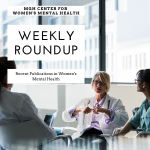Every week we review the most recent publications in women’s mental health, covering topics related to premenstrual symptoms, perinatal mood and anxiety disorders, use of medications in pregnant and breastfeeding women, perinatal substance use, and menopausal mental health.
While we now have many studies assessing the safety of antidepressants during pregnancy, we have only a handful of studies looking at the natural course of illness in women with histories of depressive illness. Specifically, we lack data which can help us predict which women are the most likely to relapse during pregnancy. Reviewing these studies, Bayrampour and colleagues attempt to quantify risk for relapse in women who discontinue antidepressants during pregnancy. We will review that study in greater detail in the coming week.
For more detailed descriptions of many of these topics, you can sign up to receive our weekly CWMH NEWSLETTER which comes out every Thursday.
Ruta Nonacs, MD PhD
PMS AND PMDD |
| No articles this week
|
INFERTILITY AND MENTAL HEALTH |
| No articles this week
|
PSYCHIATRIC ILLNESS DURING PREGNANCY |
| A randomized controlled trial of digital cognitive behavioral therapy for insomnia in pregnant women.
Kalmbach DA, Cheng P, O’Brien LM, Swanson LM, Sangha R, Sen S, Guille C, Cuamatzi-Castelan A, Henry AL, Roth T, Drake CL. Sleep Med. 2020 Mar 21;72:82-92. From pre to post treatment, CBTI patients reported reductions in ISI (-4.91 points, p < 0.001) and PSQI (-2.98 points, p < 0.001) and increases in nightly sleep duration by 32 min (p = 0.008). Sleep symptoms did not change during pregnancy in the control group. After childbirth, CBTI patients, relative to controls, slept longer by 40 min per night (p = 0.01) and reported better sleep maintenance. Bayrampour H, Kapoor A, Bunka M, Ryan D. J Clin Psychiatry. 2020 Jun 9;81(4). Free Article In women with histories of more recurrent or severe depression, high rates of relapse were observed after medication discontinuation. Shortis E, Warrington D, Whittaker P. J Affect Disord. 2020 Jul 1;272:485-495. Review. Five RCTs were eligible for inclusion, all of which found a significant decrease in depression scores following CBT interventions, greater than that observed in control groups. Improvements in depressive scores were maintained long-term for participants who received CBT. Participant satisfaction with the interventions received was high. Zhang MM, Zou Y, Li SM, Wang L, Sun YH, Shi L, Lu L, Bao YP, Li SX. Transl Psychiatry. 2020 Jun 17;10(1):193. Free Article Omega-3 fatty acids with higher ratio of EPA/DHA (?1.5) had significant efficacy both in mild-to-moderate pregnant and postpartum depression with low incidence of side effects. Galbally M, van Rossum EFC, Watson SJ, de Kloet ER, Lewis AJ. Psychoneuroendocrinology. 2019 Nov;109:104374.
|
MEDICATIONS AND PREGNANCY |
| The mother, the infant and the mother-infant relationship: What is the impact of antidepressant medication in pregnancy.
Galbally M, Watson SJ, Boyce P, Nguyen T, Lewis AJ. J Affect Disord. 2020 Jul 1;272:363-370. Overall, the study identified that antidepressant treatment in pregnancy was significantly associated with only a limited number of poorer maternal and infant outcomes and was not associated with poorer parenting outcomes. Lithium Use during Pregnancy and the Risk of Miscarriage. Poels EMP, Kamperman AM, Vreeker A, Gilden J, Boks MP, Kahn RS, Ophoff RA, Bergink V. J Clin Med. 2020 Jun 11;9(6). Free Article Miscarriages occurred in 20.8% of the lithium-exposed pregnancies (16/77), compared with 10.9% of the unexposed pregnancies (40/366) (OR = 2.14; 95% CI: 1.13-4.06). The adjusted odds ratio of miscarriage after lithium use during pregnancy was 2.94 (95% CI: 1.39-6.22).
|
POSTPARTUM PSYCHIATRIC ILLNESS |
| Adolescent and young adult mental health problems and infant offspring behavior: Findings from a prospective intergenerational cohort study.
Letcher P, Greenwood CJ, Romaniuk H, Spry E, Macdonald JA, McAnally H, Thomson KC, Youssef G, Hutchinson D, McIntosh J, Sanson A, Ryan J, Edwards B, Sligo J, Hancox RJ, Patton GC, Olsson CA. J Affect Disord. 2020 Jul 1;272:521-528. A mother’s history of persistent depression and anxiety from adolescence to young adulthood can predict higher levels of behavior problems in her infant. Harrison V, Moore D, Lazard L. BMC Pregnancy Childbirth. 2020 Jun 17;20(1):363. Free Article
|
MEDICATIONS AND BREASTFEEDING |
| No articles this week
|
PERINATAL SUBSTANCE USE |
| No articles this week
|
MATERNAL MENTAL HEALTH AND CHILD OUTCOMES |
| Paternal influences from early pregnancy to postpartum years on child development: a longitudinal study.
Wang H-Y, Huamg J-P, Lin C-L, et al. J Affect Disord, June 2020. In a study from Taiwan, 440 families completed seven assessments from early pregnancy to 2 years postpartum. Prenatal stress in the father was associated with higher risk of low birth weight. Lower levels paternal childcare and father-child interactions were associated with higher rates of developmental delay. First-time fathers tended to display lower levels of father-child interaction. The effects of paternal influence were more evident when mothers were not depressed. Fransson E, Sörensen F, Kunovac Kallak T, Ramklint M, Eckerdal P, Heimgärtner M, Krägeloh-Mann I, Skalkidou A. J Affect Disord. 2020 Aug 1;273:542-551. Free Article Maternal antenatal and persistent depression were associated with higher Child Behavior Checklist scores. Girls were affected to a greater degree. Postpartum bonding mediated most of the negative effects of postpartum and persistent depression on child behavior; not the effects of antenatal depression, however.
|
MENOPAUSE AND MENTAL HEALTH |
| No articles this week
|
OTHER TOPICS IN WOMEN’S MENTAL HEALTH |
| No articles this week |





Leave A Comment